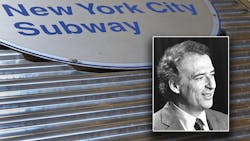OP-ED: Remembering former NY MTA Chairman Robert Kiley on his birthday
August 9 is the sixth anniversary for passing of the late New York Metropolitan Transportation Authority (MTA) Chairman Robert Kiley. Let us not forget, and those who followed him, in spending close to $135 billion dollars past multi-year MTA Capital Programs.
In May 1981, MTA Chairman Richard Ravitch wrote a letter to then New York Gov. Hugh Carey, members of the New York State Legislature, along with New York City Mayor Ed Koch. He asked that prompt action be taken to meet the increasingly desperate situation of public transit. It was a time when subway and bus ridership was falling due to track fires, equipment failures, chronic delays, growing crime and out of control graffiti.
In June 1981, the state legislature responded. They passed and Gov. Carey signed into law the Transportation System Assistance and Financing Act of 1981. This afforded MTA legal authority to issue bonds for funding. The following September, the first modern MTA five-year capital program totaling $7.2 billion was approved. This began the rebuilding of NYC’s subway and bus systems. Similar work on the Long Island Rail Road and Metro-North Railroad quickly followed.
One of then Gov. Mario Cuomo's best transportation decisions was his appointment of Kiley as MTA chairman. Kiley was the longest serving MTA chairman, holding the position between November 1983 till January 1991.
Kiley oversaw a major restoration of a transit system that was on the decline. Under his watch, with the assistance of NYC Transit President David Gunn, who served from 1984 to 1990, the MTA invested in new subway cars and buses, upgraded subway stations, tracks and signals along with improving on-time performance. This resulted in a significant increase in ridership. Elimination of graffiti, especially on subway cars, was a top priority. Kiley also brought on board Bill Bratton as chief of NYC's Transit Police to improve safety.
He supported planning initiatives which served as the foundation to advance NYC Transit's fare system from tokens to the Metro Card and now OMNY.
As MTA Chairman, Kiley was also successful in winning several billion dollars in grants from the Urban Mass Transportation Administration today known as the Federal Transit Administration (FTA). Washington played a major role in paying for many capital improvements.
Following the historic 1982 - 1986 effort under Kiley, MTA capital programs for 1987–1991, 1992–1999, 2000–2004, 2005–2009, 2010–2014 and 2015-2919 funding totaled almost $130 billion dollars.
Federal support for transportation has continued to grow over time. When a crises occurred, be it 9-11 in 2001, Super Storm Sandy in 2012 or COVID-19 in 2020, Washington was there for us. Additional billions in assistance above and beyond yearly formula allocations from the FTA (prior to 1991 known as UMTA) were provided. In 2009 the American Recovery and Reinvestment Act provided billions more.
Washington has made available $1.5 billion in 2022 FTA funding for the MTA. This does not include over $14 billion in CARE COVID-19 transit emergency relief funding. There are other opportunities for hundreds million more in other FTA discretionary national competitive grant programs.
------------------------
Larry Penner is a transportation advocate, historian and writer who previously worked for the Federal Transit Administration Region 2 New York Office. This included the development, review, approval and oversight for billions in capital projects and programs for the MTA, NYC Transit, Long Island Rail Road, Metro North Rail Road MTA Bus, New Jersey Transit along with 30 other transit agencies in NY & NJ.
About the Author

Larry Penner
Larry Penner is a transportation advocate, historian and writer who previously served as a former director for the Federal Transit Administration Region 2 New York Office of Operations and Program Management. This included the development, review, approval and oversight for billions in capital projects and programs for New Jersey Transit, New York Metropolitan Transportation Authority, NYC Transit bus, subway and Staten Island Railway, Long Island and Metro North railroads, MTA Bus, NYCDOT Staten Island Ferry along with 30 other transit agencies in New York and New Jersey.
